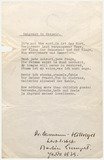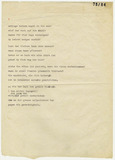Jakob Haringer: Das Fenster [The Window], poetry typescripts
Jakob Haringer: Das Fenster [The Window], poetry typescripts
Ihm gelingen jetzt glanzvoll in sich geschlossene Gebilde, wirkliche Verdichtungen, in die seine Erfahrungen der unruhvollen und bitteren Exiljahre in geläuterter und sublimierter Form eingeflossen, eingeschmolzen sind, frei von jeder Pose und Attitüde.
[He now succeeds in creating brilliantly self-contained structures, authentic manifestations into which his experiences during the troubled and bitter years of exile flow in a purified and sublimated form, melted down, free of any posturing and affectation. (trans. ed.)]
Wulf Kirsten on Jakob Haringer, 1988
Jakob Haringers poetry makes references to Expressionism, but its ballad-like style and the moods evoked by its musicality place it more in the tradition of François Villon, and particularly of Romanticism. In 1934, while in exile, Haringer published his poem Deutschland-Ode [Ode to Germany] in the exile newspaper Neuen Tage-Buch This work leaves the reader in no doubt of his anti-Fascist sentiments and concludes with an optimistic look ahead to the time when the country would finally be liberated: “The blitz... soon your walls will topple / Gone will be the brown murder, the grim mourning / Patience, my country!” But rather than the accusatory style of littérature engagée, his works have an elegiac tone which draws on his personal experiences of denigration, homesickness, alienation, grief and general introspection and places Haringer’s exile poetry close to that of Max Herrmann-Neiße The poetry anthology Das Fenster [The Window], published by Pegasus-Verlag in Zurich two years before Haringer’s death in 1946, is acclaimed by researchers as the pinnacle of his poetic output. Material hardship forced the poet to pencil his poems in tiny handwriting on the back of bills, letters or chocolate wrappers, each of which he numbered. One of the documents which testifies to his fraught struggle to obtain a functional typewriter is a letter to publisher Emil Oprecht, in which the “scrap paper poet” expresses his dissatisfaction with “an extremely old machine dating back to the Stone Age of typewriters (invisible typescript!!! etc. etc.)”.
Further reading:
Jakob Haringer: Aber des Herzens verbrannte Mühle tröstet ein Vers. Ausgewählte Lyrik, Prosa und Briefe. Hg. von Hildemar Holl. Mit einem Nachwort von Wulf Kirsten. Salzburg/Wien: Residenz Verlag 1988, S. 189.
Jakob Haringer: Du bist für keinen Stern, kein Glück geborn! Leben, Prosa & Lyrik. Eingeleitet und ausgewählt von Dieter Braeg. Berlin: Die Buchmacherei 2018.

![Manuscript notes: Jakob Haringer, Das Fenster [The Window] Manuscript notes: Jakob Haringer, Das Fenster [The Window]](/KIE/Content/EN/Images/objects/haringer-jakob-das-fenster-gedichttyposkripte-en.jpg?__blob=normal&v=4)




